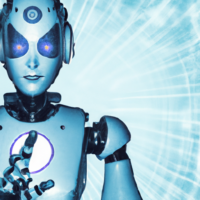Imagine a world where machines can comprehend and engage in human-like tasks, surpassing the boundaries of programmed codes. Enter the revolutionary concept of A.I. Artificial Intelligence, where intelligence meets innovation. The potential of A.I. to transform industries and reshape our lives is unprecedented. From self-driving cars to virtual assistants, the possibilities are limitless. In this article, we will explore the fascinating realm of A.I. Artificial Intelligence and its remarkable impact on our society. So fasten your seatbelt and get ready to embark on a captivating journey into the future of technology.

What is A.I. Artificial Intelligence?
Definition of A.I. Artificial Intelligence
A.I. Artificial Intelligence, commonly known as AI, is the simulation of human intelligence in machines that are programmed to think, learn, and problem-solve like a human. AI systems are designed to perform tasks that would typically require human intelligence, such as speech recognition, decision-making, problem-solving, and visual perception.
History and Evolution of A.I.
The concept of AI has been around for decades, but its development and evolution have gained significant momentum in recent years. The history of AI can be traced back to the 1950s when the term was coined by John McCarthy, an American computer scientist. Since then, AI has gone through several phases of development, including the exploration of symbolic AI, expert systems, and the emergence of machine learning and deep learning algorithms.
Types of Artificial Intelligence
There are different types of AI systems, each serving a unique purpose. The main types of artificial intelligence include:
-
Narrow or Weak AI: This type of AI is designed to perform a specific task or set of tasks. Examples of narrow AI include virtual personal assistants like Siri, chatbots, and recommendation systems.
-
General AI: General AI aims to possess the ability to understand, learn, and perform any intellectual task that a human being can do. Though still largely theoretical, the development of general AI is a subject of ongoing research.
-
Machine Learning: Machine learning is a subset of AI that allows computers to learn from data and improve their performance without being explicitly programmed. This type of AI is widely used in various applications such as predictive analytics and image recognition.
-
Deep Learning: Deep learning is a specific approach to machine learning that focuses on artificial neural networks. It enables AI systems to analyze vast amounts of data and make increasingly accurate predictions or classifications.
Applications of A.I.
A.I. in Healthcare
AI has the potential to revolutionize healthcare by enhancing diagnostics, improving patient care, and enabling personalized medicine. AI-powered systems can analyze patient data, identify patterns, and assist in diagnosing diseases at an early stage. Additionally, AI can automate administrative tasks, optimize resource allocation, and support medical research and drug discovery.
A.I. in Finance
In the finance sector, AI is used to improve risk assessment, fraud detection, and trading algorithms. AI-powered chatbots and virtual assistants assist customers with inquiries, provide personalized recommendations, and streamline financial processes. These technologies enable banks and financial institutions to enhance customer experiences, reduce costs, and make more informed decisions.
A.I. in Transportation
AI is playing a crucial role in transforming transportation systems. Self-driving cars, powered by AI algorithms and sensors, have the potential to increase road safety, reduce traffic congestion, and provide more efficient transportation solutions. Additionally, AI-based algorithms can optimize route planning, fleet management, and logistics in the transportation industry.
A.I. in Education
In the field of education, AI is being utilized to enhance personalized learning experiences, provide intelligent tutoring, and automate administrative tasks. AI-powered educational platforms can adapt content to individual learning styles, provide real-time feedback, and track student performance. This technology has the potential to revolutionize education by improving engagement, accessibility, and overall learning outcomes.
A.I. in Customer Service
AI is increasingly being employed in customer service to enhance customer experiences and improve efficiency. Chatbots and virtual assistants can engage with customers, provide instant responses to queries, and assist in issue resolution. These AI-powered systems enable businesses to provide round-the-clock support, reduce wait times, and deliver personalized services.
A.I. in Entertainment
In the entertainment industry, AI is utilized for content recommendation, personalized experiences, and content generation. AI algorithms analyze user preferences and behavior to suggest movies, music, and personalized content. Additionally, AI can generate virtual characters, special effects, and assist in video game development, enhancing the overall entertainment experience.
A.I. in Manufacturing and Automation
A.I. and automation technologies are transforming the manufacturing industry by improving production efficiency and reducing costs. AI-powered robots optimize manufacturing processes, perform repetitive tasks, and enhance precision in assembly lines. This technology allows manufacturers to increase productivity, improve quality control, and respond quickly to changing market demands.
Ethical Considerations of A.I.
Privacy and Data Security
As AI systems analyze and process vast amounts of data, ensuring privacy and data security becomes a critical concern. There is a need to establish robust frameworks and regulations to protect personal information and prevent unauthorized access or misuse of data.
Job Displacement
The widespread adoption of AI technology raises concerns about potential job displacement. As AI systems automate various tasks, certain jobs may become obsolete or require fewer human workers. It is essential to address this issue by reskilling and upskilling the workforce to adapt to the changing job market.
Bias and Fairness
AI systems are prone to biases, as their algorithms are developed based on historical data that may reflect societal biases or systemic discrimination. Efforts must be made to ensure fairness, transparency, and inclusivity in AI systems to mitigate bias and prevent the perpetuation of harmful stereotypes.
Autonomous Weapons
The development of autonomous weapons powered by AI raises ethical concerns related to the potential lack of human control and accountability. The use of AI in military applications should be carefully regulated to prevent the misuse of these technologies and protect human lives.
Human-A.I. Interaction
As AI systems become more sophisticated, it is crucial to establish effective human-AI interaction to ensure trust, resilience, and collaboration. Building user-friendly interfaces and interfaces that allow humans to understand AI decision-making processes will be essential in establishing successful human-AI partnerships.
Superintelligence and Existential Risk
The potential emergence of superintelligent AI systems, surpassing human intelligence, raises concerns about existential risks. It is essential to consider the ethical implications, safety measures, and regulatory frameworks surrounding the development and deployment of superintelligent AI.
Benefits of A.I.
Increased Efficiency and Productivity
A.I. technology can automate repetitive and mundane tasks, allowing humans to focus on more complex and creative work. This enhances overall efficiency and productivity in various industries, leading to improved outcomes and cost savings.
Improved Decision Making
A.I. systems can process vast amounts of data and provide valuable insights, enabling more informed decision-making. By analyzing patterns, trends, and correlations, AI algorithms can assist businesses and policymakers in making better-informed choices.
Automation and Labor Reduction
By automating tasks that were previously performed by humans, AI technology can reduce the need for human labor in certain areas. This can lead to cost savings for businesses and enable employees to pursue more fulfilling and creative roles.
Enhanced Personalization
AI-powered systems can analyze individual preferences, behavior, and needs to provide highly personalized experiences. From personalized recommendations in e-commerce to tailored educational content, AI enhances user satisfaction by catering to specific preferences and requirements.
Advanced Data Analysis
AI algorithms have the capability to analyze and interpret complex datasets more accurately and efficiently than humans. This enables businesses, researchers, and policymakers to gain valuable insights, identify patterns, and make data-driven decisions.
Creativity and Innovation
AI technology has the potential to augment human creativity and innovation by providing tools and platforms to generate new ideas. AI-powered systems can assist in creative tasks such as content generation, art, and design, pushing the boundaries of human imagination.

Challenges and Limitations of A.I.
Data Limitations
AI systems heavily rely on data to learn and make accurate predictions. Lack of quality data or biased datasets can limit the effectiveness and fairness of AI algorithms. Efforts should be made to ensure the availability of diverse and representative datasets for AI development.
Algorithmic Bias
AI algorithms can inadvertently perpetuate existing biases or discriminate against certain groups if not properly designed or trained. It is crucial to address algorithmic bias by improving transparency, accountability, and inclusivity in algorithmic decision-making processes.
Lack of Common Sense
AI systems often lack common sense reasoning, which can lead to inaccurate or illogical decision-making. Teaching machines common sense knowledge and ensuring they can reason and understand context will be a significant challenge in AI development.
Ethical Dilemmas
The development and deployment of AI raise complex ethical dilemmas that need to be addressed. Questions such as who is responsible for AI decisions, how to prioritize different values, and the impact on societal norms and values need careful consideration.
Difficulties in Replicating Human-Like Intelligence
Replicating human-like intelligence remains a significant challenge in AI development. While AI systems can excel at specific tasks, achieving general intelligence comparable to human intelligence is an ongoing area of research.
Lack of Emotional Intelligence
AI systems lack emotional intelligence and cannot understand or respond to human emotions in the same way as humans. This limits their ability to effectively engage and empathize with humans, particularly in fields such as healthcare and customer service.
Future Trends and Developments in A.I.
Deep Learning and Neural Networks
Deep learning, a subset of machine learning, focuses on artificial neural networks inspired by the human brain. Advancements in deep learning algorithms, combined with the availability of massive computing power, have the potential to drive breakthroughs in AI capabilities.
Explainable A.I.
Explainable AI aims to make AI decision-making processes transparent and understandable to humans. Ensuring that AI systems can justify their decisions and provide explanations will be crucial for gaining trust and wider adoption of AI.
Quantum Computing and A.I.
Quantum computing holds promise for significantly accelerating AI capabilities by processing complex calculations and data more efficiently. The combination of quantum computing and AI has the potential to unlock new possibilities in fields such as drug discovery, optimization, and cryptography.
A.I. for Social Good
The application of AI for social good aims to address global challenges such as poverty, healthcare, and climate change. AI can be utilized in disaster response, public health monitoring, and resource optimization, among other areas, to make a positive impact on society.
Collaborative Intelligence
Collaborative intelligence refers to the partnership between humans and AI systems, combining their respective strengths to achieve better outcomes. By leveraging human intuition and creativity alongside AI’s computational power, collaborative intelligence can drive innovation and problem-solving.
Ethical Frameworks for A.I.
The development of ethical frameworks is crucial for guiding the responsible development and use of AI. Establishing principles and guidelines that prioritize fairness, accountability, transparency, and human well-being will be essential to address the ethical challenges posed by AI.

The Role of A.I. in Robotics
Introduction to Robotics
Robotics is the field of designing, building, and programming physical machines capable of autonomously performing tasks or interacting with the environment. AI plays a crucial role in enhancing the capabilities of robotic systems.
Integration of A.I. and Robotics
AI technologies, such as machine learning and computer vision, are integrated into robotic systems to enable them to perceive and interact with the world. AI algorithms help robots make decisions, adapt to dynamic environments, and perform complex tasks.
Robots in Daily Life
Robotic AI has the potential to impact various aspects of daily life. From domestic robots assisting with household chores to healthcare robots providing support to the elderly or disabled, AI-powered robots can improve the quality of life and provide valuable assistance.
Robots in Industries
AI-powered robots are increasingly being used in industrial settings to automate repetitive and physically demanding tasks. These robots can enhance productivity, precision, and safety in manufacturing, logistics, and hazardous environments.
Social and Ethical Implications of Robotic A.I.
The integration of AI and robotics raises important social and ethical considerations. Issues such as robot ethics, job displacement, human-robot interaction, and the impact on social norms need to be addressed to ensure the responsible and beneficial deployment of robotic AI.
A.I. and the Job Market
Automation and Job Displacement
The increasing automation of tasks through AI technology raises concerns about potential job displacement. Certain occupations, particularly those involving routine and repetitive tasks, may be more susceptible to automation, necessitating a reevaluation of workforce skills and employment opportunities.
A.I.-Driven Job Creation
While AI may automate certain jobs, it also has the potential to create new job opportunities. AI technology development, implementation, and maintenance will require a skilled workforce, presenting new career paths and job roles.
Reskilling and Adaptation
To navigate the changing job market influenced by AI, reskilling and adaptation become essential. Investment in lifelong learning, providing opportunities for upskilling, and retraining programs can help individuals and organizations adapt to the evolving demands of the job market.
Collaboration Between Humans and A.I.
Rather than replacing humans, the collaboration between humans and AI systems is expected to be more prevalent in the future job market. The ability to work alongside AI and leverage its capabilities will become an important skillset for individuals across various industries.
A.I. and the Future of Healthcare
Personalized Medicine
AI technology enables personalized medicine by utilizing patient data, genetic information, and medical history to develop tailored treatment plans. By analyzing vast amounts of data, AI algorithms can identify patterns and predict disease outcomes, improving patient care and treatment efficiency.
Digital Diagnostics
AI-powered diagnostic systems can analyze medical images, lab results, and patient data to assist healthcare professionals in accurate and timely diagnoses. AI algorithms can detect patterns, anomalies, and early signs of diseases, enabling timely interventions.
Health Monitoring and Analysis
Wearable devices and IoT technology, combined with AI analysis, allow for continuous health monitoring and analysis. AI-powered systems can track vital signs, detect abnormalities, and provide personalized health insights, empowering individuals to take proactive measures for their well-being.
Drug Discovery and Development
AI is transforming drug discovery and development processes, reducing costs and accelerating research timelines. AI algorithms can analyze massive datasets, identify potential drug candidates, and simulate molecular interactions, significantly enhancing the efficiency of the drug discovery pipeline.
A.I. in Surgery and Robotics
Robotic surgeries powered by AI technology offer precision, enhanced visualization, and reduced invasiveness. AI systems can assist surgeons in planning procedures, provide real-time guidance, and analyze complex data during surgeries, improving patient outcomes and safety.
The Ethical Debate Surrounding A.I.
Ethical Concerns in A.I. Development
The development and deployment of AI systems raise ethical concerns regarding their impact on society, privacy, and human values. Ethical considerations include ensuring fairness, transparency, and accountability in AI decision-making processes and minimizing potential harm to individuals and communities.
Transparency and Accountability
Transparency and accountability in AI systems are essential to ensure the responsible and ethical use of the technology. Developers and organizations should make efforts to explain AI decisions, disclose data sources, and establish mechanisms for addressing potential biases or errors.
A.I. Policy and Regulation
As AI technologies advance, the need for robust policies and regulations becomes paramount. Effective governance frameworks must be developed to address issues such as data privacy, algorithmic transparency, job displacement, and ethical standards in AI development and deployment.
Human Control and Responsibility
Maintaining human control and responsibility over AI systems is a crucial ethical consideration. While AI can automate decision-making, humans must retain the ability to oversee, intervene, and be accountable for the actions and outcomes of AI systems.
In conclusion, AI has emerged as a transformative technology with applications spanning various industries and sectors. While it presents numerous benefits, such as increased efficiency, improved decision-making, and advanced data analysis, there are also ethical considerations and challenges that need to be addressed. Privacy, job displacement, bias, and responsibility are key concerns that must be carefully navigated to ensure the responsible development and deployment of AI. As AI continues to evolve and shape our future, proactive efforts in regulation, collaboration, and ethical frameworks will be essential to harness its full potential for positive impact.






